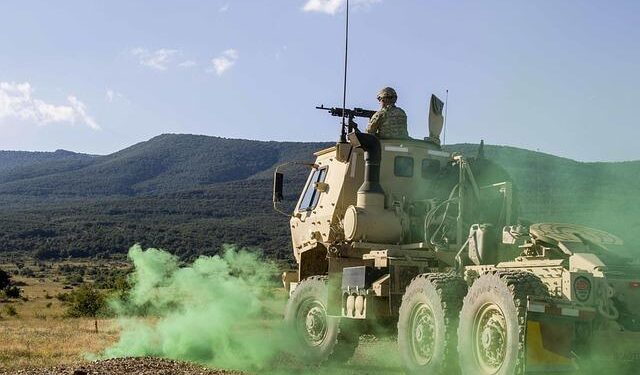On September 16, 2025, NATO officially inaugurated a new liaison office in Amman, marking a significant step in strengthening cooperation between the alliance and Jordan. The establishment of this office underscores NATO’s commitment to fostering regional stability and enhancing strategic partnerships in the Middle East. Positioned in the Jordanian capital, the liaison office aims to facilitate closer diplomatic dialogue, coordinate joint initiatives, and support ongoing security efforts amid a complex geopolitical landscape. This development reflects NATO’s broader efforts to expand its presence and collaboration beyond its traditional Euro-Atlantic sphere.
NATO Establishes Liaison Office in Amman to Strengthen Regional Cooperation
NATO has officially inaugurated its new liaison office in Amman, marking a significant step towards enhanced collaboration with regional partners. This strategic move aims to foster deeper diplomatic engagements, intelligence sharing, and joint security initiatives across the Middle East. The office will serve as a pivotal hub for coordinating efforts related to counter-terrorism, crisis management, and defense capacity-building in neighboring countries. Officials emphasized that this initiative reflects NATO’s commitment to stability and resilience within a critical geopolitical area.
Key objectives of the Amman Liaison Office include:
- Strengthening dialogue between NATO and regional governments
- Facilitating military and civilian cooperation programs
- Supporting regional security through timely intelligence exchange
- Enhancing preparedness for humanitarian and peacekeeping missions
| Focus Area | Main Activity | Expected Outcome |
|---|---|---|
| Counter-Terrorism | Joint training exercises | Improved operational response |
| Intelligence Sharing | Regular coordination meetings | Enhanced situational awareness |
| Humanitarian Assistance | Coordinated disaster relief plans | Faster crisis response |
Strategic Implications for Middle East Security and Diplomatic Engagement
The establishment of the NATO liaison office in Amman marks a pivotal development in enhancing the alliance’s strategic footprint in the Middle East. By embedding a formal diplomatic channel within Jordan, NATO aims to bolster regional security frameworks while fostering closer collaboration with Arab partners. This move not only signals NATO’s commitment to counterterrorism and conflict prevention but also provides a platform for real-time intelligence sharing and joint crisis management initiatives.
Key implications for the region include:
- Enhanced Diplomatic Engagement: Facilitating dialogue on security concerns between NATO members and Middle Eastern states.
- Stabilization Efforts: Supporting peacekeeping operations and conflict resolution mechanisms more effectively.
- Counterterrorism Collaboration: Strengthening joint efforts against extremist threats with on-ground coordination.
| Focus Area | Expected Outcome |
|---|---|
| Security Cooperation | Improved joint defense strategies |
| Diplomatic Outreach | Stronger regional partnerships |
| Crisis Management | Rapid coordinated responses |
Recommendations for Enhancing NATO-Jordan Collaboration and Regional Stability
To deepen the strategic ties between NATO and Jordan, it is essential to focus on joint capacity-building programs that address emerging security challenges in the Middle East. Emphasizing multilateral military exercises and intelligence-sharing platforms will enhance interoperability and foster real-time responsiveness to regional crises. These initiatives should particularly prioritize counterterrorism efforts, cyber defense, and border security to safeguard not only Jordan but the wider region from destabilizing threats.
In addition, reinforcing diplomatic engagement through regular high-level dialogues will help align NATO’s strategic priorities with Jordan’s national interests. Investment in sustainable development and humanitarian assistance, especially in conflict-affected neighboring areas, will further promote stability. A strategic framework outlining key areas of cooperation could be visualized as follows:
| Area of Cooperation | Focus | Impact |
|---|---|---|
| Security Training | Advanced military skills & cyber defense | Enhanced operational readiness |
| Intelligence Sharing | Real-time threat exchange | Faster crisis response |
| Development Aid | Infrastructure & humanitarian support | Regional socio-economic stability |
| Diplomatic Dialogue | Regular strategic consultations | Stronger political cohesion |
Key Takeaways
As NATO establishes its new liaison office in Amman, the move underscores the alliance’s commitment to strengthening ties with key partners in the Middle East. This development is expected to enhance coordination on regional security challenges and foster deeper diplomatic engagement. As events unfold, stakeholders will be watching closely to see how this strategic foothold influences NATO’s role and cooperation in a complex geopolitical landscape.














